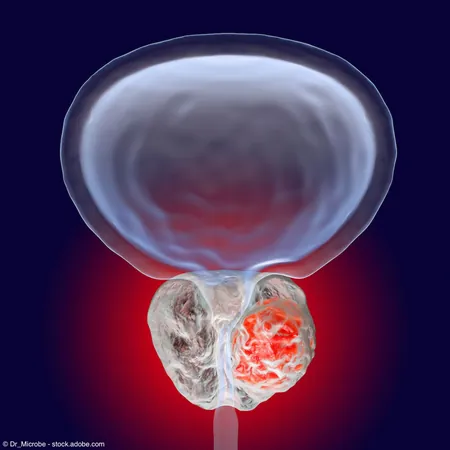
Breakthrough Study Reveals Isodose MHFRT as the Future Standard in Prostate Cancer Treatment!
2025-03-22
Author: Rajesh
A groundbreaking meta-analysis recently published in *Lancet Oncology* has shed new light on the efficacy of different radiotherapy regimens for prostate cancer, suggesting that isodose moderately hypofractionated radiotherapy (MHFRT) could become the new standard of care. This rigorous study has found that isodose MHFRT offers comparable effectiveness to traditional conventionally-fractionated radiotherapy (CFRT) while presenting significantly fewer risks of side effects.
The analysis, which combined data from seven phase 3 clinical trials, revealed that while dose-escalated MHFRT demonstrated similar effectiveness to CFRT, it was linked to a higher likelihood of bowel toxicity. In contrast, patients receiving isodose MHFRT reported no increased risk of urinary or bowel complications, making it a safer alternative.
Dr. Amar U. Kishan, who co-led the study and is the executive vice chair of radiation oncology at UCLA’s David Geffen School of Medicine, stated, “These findings strongly indicate that isodose MHFRT should be adopted as the preferred MHFRT regimen for prostate cancer patients.” His assertion is backed by statistics showing that the progression-free survival (PFS) rates—crucial indicators of treatment effectiveness—were nearly identical between those receiving isodose MHFRT and those undergoing CFRT.
Specifically, the study showed that after a median follow-up of 5.4 years, the estimated 5-year PFS was 77% for MHFRT compared to 75.6% for CFRT, with no statistically significant differences observed in overall survival rates as well. The safety profiles of both treatments were rigorously compared, with researchers conclusively finding that isodose MHFRT posed no increased risk for grade 2 or higher genitourinary or gastrointestinal toxicities.
Interestingly, while dose-escalated MHFRT also showed similar PFS when compared to CFRT, it posed a concerning increase in both genitourinary and gastrointestinal side effects, signaling a need for caution in its use. For instance, this approach was associated with a 53% increased chance of severe gastrointestinal toxicity and a 68% increased risk of notable bowel quality of life decline.
This study not only champions isodose MHFRT as an effective treatment option but also aligns with a broader trend in oncology towards personalized, less invasive treatment regimens. As Dr. Kishan emphasized, patients can expect effective outcomes while minimizing their time in treatment—a significant advantage in enhancing their quality of life.
With these new findings, prostate cancer treatment may be on the brink of major changes, urging oncologists worldwide to reevaluate and potentially adopt isodose MHFRT over traditional approaches. As always, patients are encouraged to discuss the best options with their healthcare providers and to stay informed about the latest advances in cancer treatment for the best possible care.

 Brasil (PT)
Brasil (PT)
 Canada (EN)
Canada (EN)
 Chile (ES)
Chile (ES)
 Česko (CS)
Česko (CS)
 대한민국 (KO)
대한민국 (KO)
 España (ES)
España (ES)
 France (FR)
France (FR)
 Hong Kong (EN)
Hong Kong (EN)
 Italia (IT)
Italia (IT)
 日本 (JA)
日本 (JA)
 Magyarország (HU)
Magyarország (HU)
 Norge (NO)
Norge (NO)
 Polska (PL)
Polska (PL)
 Schweiz (DE)
Schweiz (DE)
 Singapore (EN)
Singapore (EN)
 Sverige (SV)
Sverige (SV)
 Suomi (FI)
Suomi (FI)
 Türkiye (TR)
Türkiye (TR)
 الإمارات العربية المتحدة (AR)
الإمارات العربية المتحدة (AR)